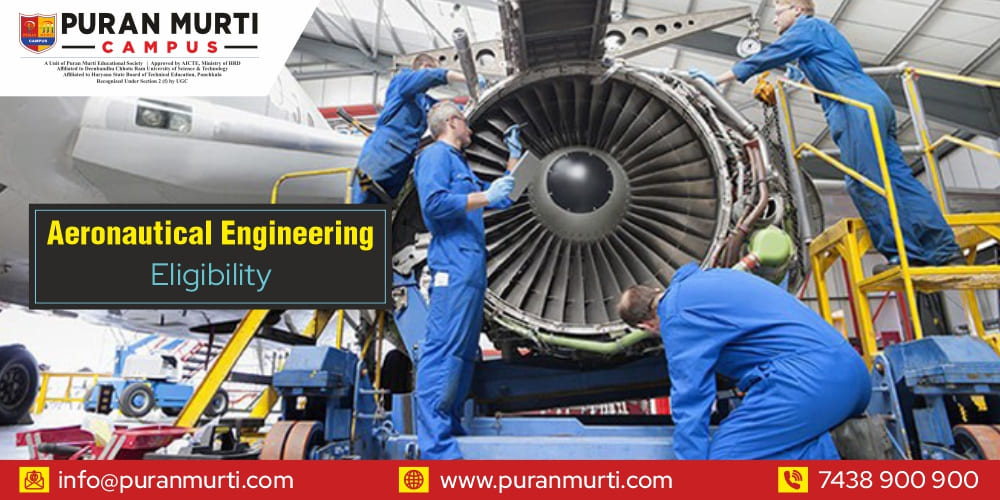Aeronautical Engineering Eligibility
Posted on : 27 May, 2025 12:02 am
Have you ever gazed up at a flying airplane and had the thought, “Wow… how does that thing even work?” If you’re the type of person who dreams of designing or working on airplanes, then aeronautical engineering eligibility could be the ideal career path for you.
But before you begin constructing your dreams, let’s first get a grasp on the eligibility criteria—essentially, what it takes to study this thrilling subject.
This blog will take you through it all: your school topics, entrance exams, core skills, and even top colleges where you can start out—like the Puran Murti Vidyapeeth, one of the emerging players in aeronautical engineering studies.
🛫 So, What Is Aeronautical Engineering?
In simple words, aeronautical engineering is all about aircraft—how they’re designed, how they fly, and how they’re maintained. It’s a branch of engineering that combines physics, maths, and a whole lot of passion for the skies!
Whether it’s commercial airplanes, fighter jets, or drones—you’ll be the one behind the technology that keeps them flying.
📚 Who Can Apply? (Eligibility Criteria After 12th)
Before you get into engines and aircraft design, here’s what you must qualify:
✅ 1. Educational Requirements
-
You must have passed Class 12 (10+2) from a well-recognized board.
-
Your main subjects must include:
-
Physics
-
Mathematics
-
Chemistry
-
-
You’ll require a minimum of 50–60% marks (dependent upon the college).
-
Top institutes may require 70% and more in PCM (Physics, Chemistry, Math).
✍️ Tip: Concentrate on your science subjects at school. They’re your stepping stone!
✅ 2. Entrance Exams You May Have to Give
To enter the majority of engineering colleges, you will have to sit for entrance exams such as:
-
JEE Main & Advanced – IITs and NITs
-
State-level examinations such as MHT-CET (Maharashtra), KCET (Karnataka), etc.
-
University-level tests like VITEEE, SRMJEEE, AEEE
-
Direct Admission – Some colleges such as Puran Murti Vidyapeeth also provide direct admission on the basis of merit or internal exams.
🎯Not sure about competitive exams? Don’t worry. Plenty of good colleges also admit students on the basis of Class 12 marks.
✅ 3. Post 10th: Diploma Course
If you’re finished with 10th and wish to get started early, you can pursue a Diploma in Aeronautical Engineering.
Here’s what you need:
-
Passed Class 10 with Science and Math
-
Minimum 45–50% marks
-
Post-diploma, you can even get lateral entry in the 2nd year of a B.Tech course.
🧠 What Qualities Do You Possess (Apart from Marks)?
Of course, marks matter—but so do actual skills that will serve you well in this profession.
Here’s what a good aeronautical engineer looks like:
-
Curiosity about how things work
-
Strong understanding of physics and math
-
Problem-solving attitude
-
Patience and precision
-
Teamwork and communication skills
-
Love for machines, innovation, and… flying!
💬 “You don’t need to be a genius. Just be inquisitive, diligent, and open-minded.”
🎓 Best Aeronautical Engineering Colleges in India
Now, let’s discuss where you can actually pursue this course. Here’s a combination of government and private colleges, including one of the finest upcoming institutes:
| College Name | Course Offered | Admission Process |
|---|---|---|
| Puran Murti Vidyapeeth, Sonipat (Haryana) | B.Tech in Aeronautical Engineering | Direct Admission / Merit-Based |
| IIT Bombay / IIT Kanpur | B.Tech in Aerospace Engineering | JEE Advanced |
| IIST (Indian Institute of Space Science & Technology) | B.Tech in Aerospace | JEE Advanced |
| Hindustan Institute of Technology & Science | B.Tech in Aeronautical Engineering | Institute Test / JEE |
| Punjab Engineering College | B.Tech in Aerospace Engineering | JEE Main |
📍 Why Puran Murti Vidyapeeth?
Located in Sonipat, Haryana, it’s known for its hands-on teaching style, strong placement support, and up-to-date labs. It’s a great choice if you’re looking for quality education without the high cut-offs of IITs.
💬 Final Thoughts: Ready to Fly?
Aeronautical engineering, by choice, is enlisting to be a part of the future of flight. From developing high-speed aircraft to collaborating with institutions such as ISRO or DRDO, the scope is limitless.
Provided you achieve the eligibility, remain diligent, and fire your imagination—you’re already on your path to success.
🙋♂️ FAQs – Fast answers to some of the most frequent questions
Q: Can I do aeronautical engineering without Physics and Math?
👉 No, Math and Physics are a prerequisite for this discipline.
Q: Do I need NEET for aeronautical engineering?
👉 Nope! NEET is for medical studies. For engineering, target JEE or other technical exams.
Q: Can I have a government job after studying this?
👉 Yes! You can work for premium govt organizations such as ISRO, DRDO, HAL, and even Indian Air Force (tech branches).

